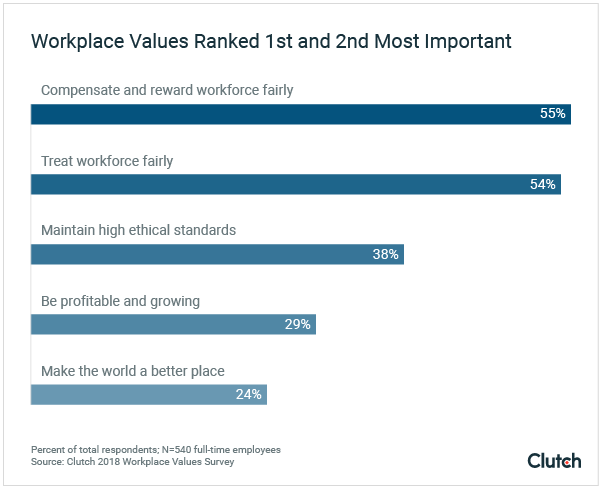How Can Companies Encourage Ethics in the Workplace?

How Can Companies Encourage Ethics in the Workplace?
38% of employees consider “ethical standards” to be the first or second-most important workplace attribute. Here are 4 ways that companies can encourage ethics in the workplace, secure and retain the best talent, and mitigate the risk of noncompliance.
Updated October 13, 2023
People spend much of their lives at work. An ethical workplace is key because it allows employees to feel a sense of purpose and integrity on the job.
A recent survey found that 38% of employees consider “ethical standards” to be the first or second-most important workplace attribute.

Companies benefit from ethical behavior in various ways.
The stock price of the 100 most ethical firms outperforms their peers by 300%, according to the Society for Human Resource Management.
A reputation for ethics also helps to attract and retain the best talent while minimizing the cost of turnover. When staff feel integral about their work, the company culture will thrive and, in turn, boost morale, motivation, and productivity.
Despite the value of ethical behavior, it can be difficult to encourage ethics in the workplace.
Defining Workplace Ethics
Workplace ethics refers to the principles and values that guide behavior and decision-making in a professional setting. To have consistent workplace ethics, company leaders and employees must understanding and adhering to a set of moral standards that govern interactions between individuals, teams, and organizations
Many companies will outline their company values in their employee handbook. They highlight key ethics that should guide every employee in their day-to-day.
Some Common Workplace Ethics that are included in company handbooks are:
- Integrity: Being honest, trustworthy, and maintaining high moral standards in all actions and decisions.
- Respect: Treating colleagues, superiors, and subordinates with dignity, valuing diversity, and promoting inclusivity.
- Fairness: Ensuring that all employees are treated equitably, without bias or discrimination, and following just and transparent processes.
- Accountability: Taking responsibility for one's actions, meeting deadlines, and delivering on commitments.
- Confidentiality: Safeguarding sensitive information and respecting privacy rights of colleagues and clients.
- Professionalism: Conducting oneself in a manner that reflects competence, good judgment, and appropriate behavior in the workplace.
- Teamwork: Collaborating effectively with others, valuing cooperation over competition, and fostering a positive and supportive work culture.
However, every company must consider what they value most to make sure their company operated ethically.
4 Ways to Foster an Ethical Workplace
While it's easy to state that your company follows your workplace values, that isn't always the case. To develop an ethical culture, company leaders need to consciously put in the effort to foster a community focused on ethical decision making.
Here are a few ways business leaders can encourage an ethical work environment.
-
Lead by example
-
Provide actionable resources
-
Ask employees to write a personal code
-
Reward ethical behavior
1. Lead By Example
Leaders must model the behavioral norms they expect employees to follow.
To demonstrate their company’s ethics, leaders can:
-
Create a code of ethics
-
Hire with an emphasis on ethical behavior
-
Refer staff to the compliance department
-
Reward ethical behavior in the workplace
-
Promote only employees who demonstrate ethical behavior
-
Communicate the importance of ethics via regular emails or employee meetings
Leaders who act ethically set a positive tone at their company and also reap additional benefits.
For example, when Intel decided to stop sourcing material from conflict zones, it wasn’t without cost. But as “the right thing to do,” the decision earned positive responses from consumers, activists, and allowed the microchip producer to secure a more sustainable supply chain.
“Ensuring the ability to source from multiple regions of the world is a good thing,” said Gary Niekerk, Director of Corporate Citizenship at Intel. “It was done because it is the right thing to do, but as you back out, you see additional values,” he concluded.
A reputation for ethics helps companies to attract and retain quality employees. These individuals then foster and grow a work culture that's built around shared values.
Job seekers often choose the company whose ethics most align with theirs, especially in fields with little difference in job description.
“The first thing students looked for when choosing among accounting firms is which one shared their values,” said Jane Cote, Academic Director and Associate Professor at the Carson College of Business.
Principles are exceeding pay as the deciding factor for many graduates. “The question for the students was, ‘How can I find a firm that aligns with the kind of person I want to be?’” Cote concluded.
“The question for the students was, ‘How can I find a firm that aligns with the kind of person I want to be?’”
Ethical leadership creates a trickle-down effect that helps to attract and retain the best employees, develop a reputation for sound ethics, and implement more sustainable practices.
2. Provide Ethics Training
Workshops and training help staff to recognize many ethical dilemmas, but these resources often fail to grasp the reality of many ethical breaches.
According to a study published in the Harvard Business Review, most ethical breaches aren’t from bribery, corruption, or anti-competition.
The study found the most common and recurrent quandaries to be interpersonal, extra-legal, and full of grey areas, such as:
-
Pressures or incentives to inflate achievement targets
-
Ignoring cross-cultural values after globalization
-
Compromised loyalties or conflicts of interest in times of growth and change
Resources that consistently encourage ethics are most effective, unlike trainings and one-off events.
In the following example, the software company Adobe uses its blog to exemplify the ideal company culture.

The blog is a vivid and regularly-updated model of what’s expected from Adobe employees. A wide range of blog topics, from ethics to inclusivity, illustrate the values that are best for the company, fellow workers, and the wider world.
Documenting the ethical behaviors of other employees is a powerful form of social proof. The social influence of peers reinforces the idea that individual ethics are active and essential to the company culture.
In moments of uncertainty, the blog is a constant reminder of what others would do and should be done.
Other resources that actively encourage ethics are:
-
Onboarding packages for new hires that emphasize the importance of ethics
-
Approachable HR departments that emphasize what’s ethical, not just legal
Ethics are a living part of the best companies – whose workplaces thrive as a result of the values and integrity within.
3. Ask Employees to Write a Personal Code
Ethical decisions are made one person at a time, one decision at a time.
Laws and compliance regulations are often geared toward larger transgressions, however, and can overlook smaller ethics violations that can nonetheless damage the company.
Many ethical dilemmas are interpersonal, carry the potential for repercussion, and are therefore hard to navigate. It’s often easier for employees to do nothing than to make a tough decision.
Planning ahead helps to encourage follow through when employees are faced with an ethical dilemma.
“When it comes to ethics, we think it's a test of our moral identity, which makes us more emotional, less effective, and vulnerable to self-deluding,” said Mary Gentile, author of Giving Voice to Values and Professor at Babson College.
Ask employees to keep a personal code of ethics, a list of unethical things they will never do. Also prompt them to write about how they would, ideally, respond to unethical situations that might arise in the workplace.
For example, ask employees to keep a document that details how they would react to:
-
Sexual harassment
-
Offers for unethical incentives
-
Requests by management and coworkers to falsify reports or misuse data
-
Requests to cover for a co-worker who wants to leave early
-
Opportunities to take credit for the work of others
If staff keep a written code of ethics at hand, they will be more likely to act with integrity. Rehearsing the exact language needed to confront an ethical transgressor can strengthen employees’ resolve prior to a difficult exchange.
“The key is to practice ahead of time, before a situation arrives, so you’re ready when it does,” concluded Gentile.
Peers are the greatest source of influence on employee ethics. Only 25% of employees trust their peers to model and practice the right ethical behaviors, according to Gartner.
Personal integrity leads to a robust company culture that drives ethical behavior.
For example, the staff at Google staff recently signed a petition to divorce the company from a contract with the Pentagon. Employees felt that “Google should not be in the business of war,” and rallied 3,100 signatures to protest a project with technology that could enable drone warfare, as seen below.

Employees with a clear code of ethics are more likely to express their opinions. Companies benefit when staff are open, honest, and offer critical feedback.
4. Reward Ethical Behavior
What gets rewarded gets repeated.
People spend more time at work than ever, so it’s critical that employees feel a sense of honesty and integrity in the workplace.
Recognize when people do the right thing and also make clear that a win-at-all-cost mentality will not be tolerated. The ethical lapses of companies like Nike, Facebook, and Wells Fargo can be used to illustrate the importance of moral best practices.
Companies can incentivize ethics in various ways:
-
Hire with an emphasis on ethics
-
Promote only employees who demonstrate ethical behavior
-
Train leaders to recognize and commend employees for acting in ways that align with workplace ethics.
-
Create a peer and supervisor nomination system that recognizes employees for ethical behavior.
-
Include workplace ethics in your criteria for rewards and recognition, and maintain a leaderboard throughout the year.
Offering incentives helps to reinforce the value of ethics. Intrinsic motivations are more powerful than extrinsic motivations, so provide benefits that foster a sense of pride and agency within the company.
For example, offering a front-row parking space or travel perks would confer a visible status boost without increasing expense too much.
Before you can reward ethical behavior, the employee code of conduct must be well-known and available.
To maximize the visibility of your code of conduct:
-
Post the code of conduct on the company website, in employee newsletters, and on workplace bulletin boards.
-
Reference the code of conduct as part of the performance standards during employee evaluations.
-
Provide new hires with an onboarding package that emphasizes the code of conduct and all ethics-related incentives
Companies Can Encourage Ethics in the Workplace
Companies can encourage workplace ethics by preparing and supporting staff to act right.
Good intentions and proclamations aren’t enough, so leaders must both model and reward ethical behavior in employees.
A company with a strong code of conduct will attract and secure employees with ethical behavior, which benefits the company culture and the bottom line.
